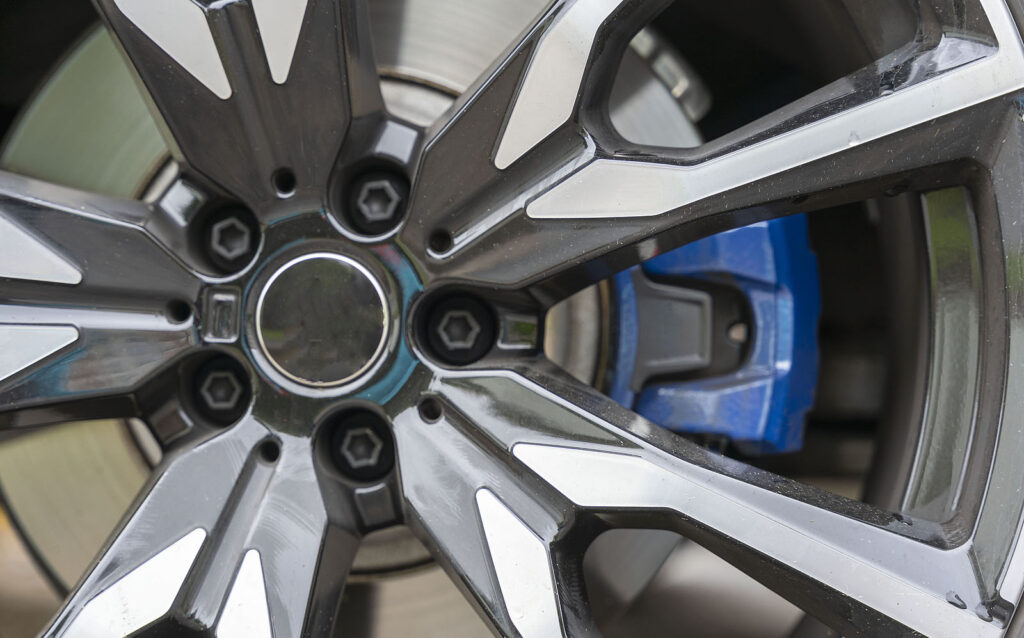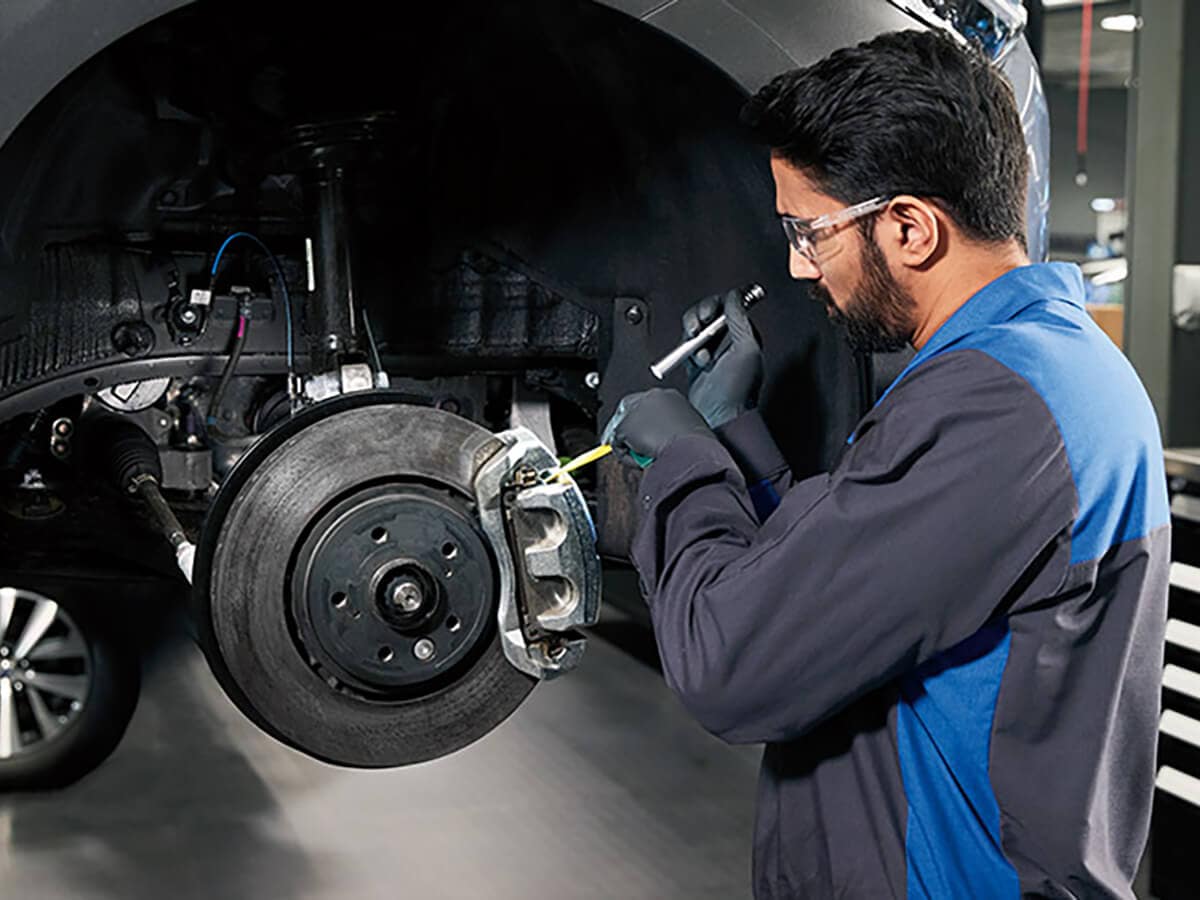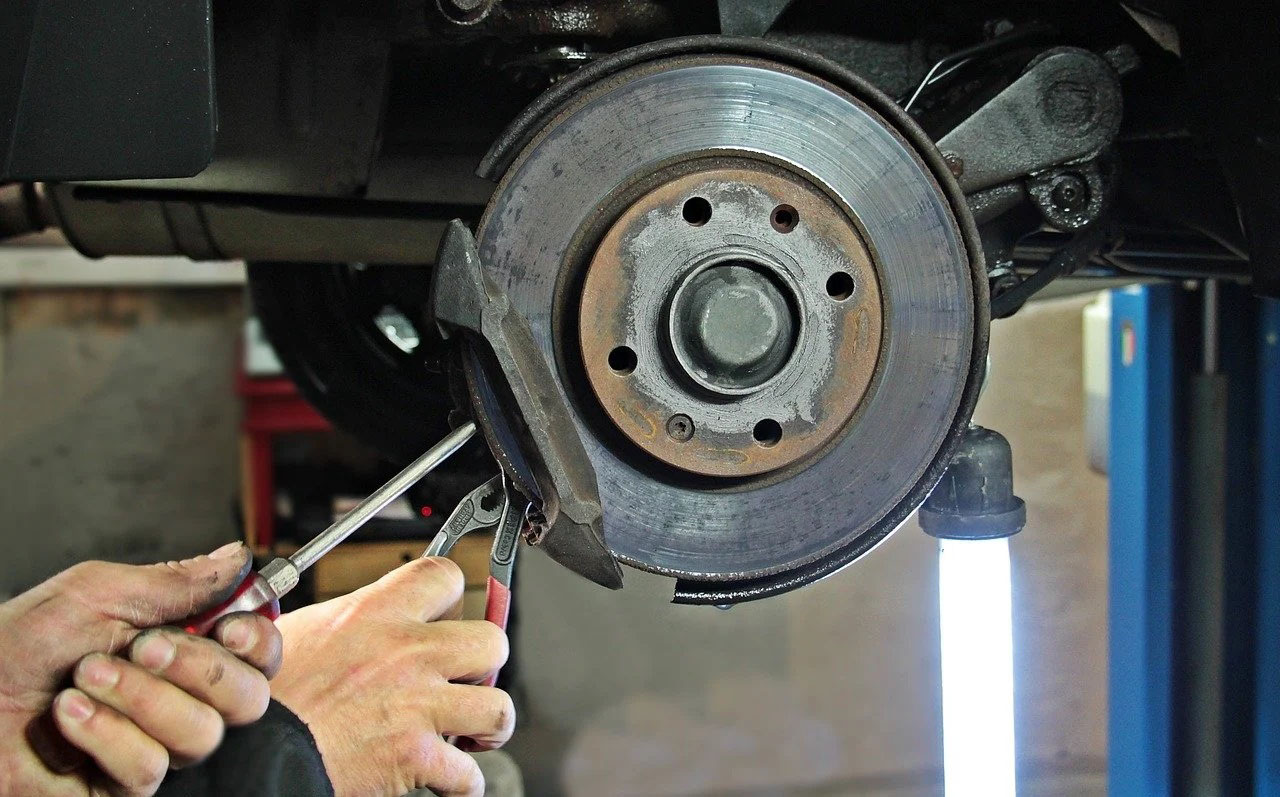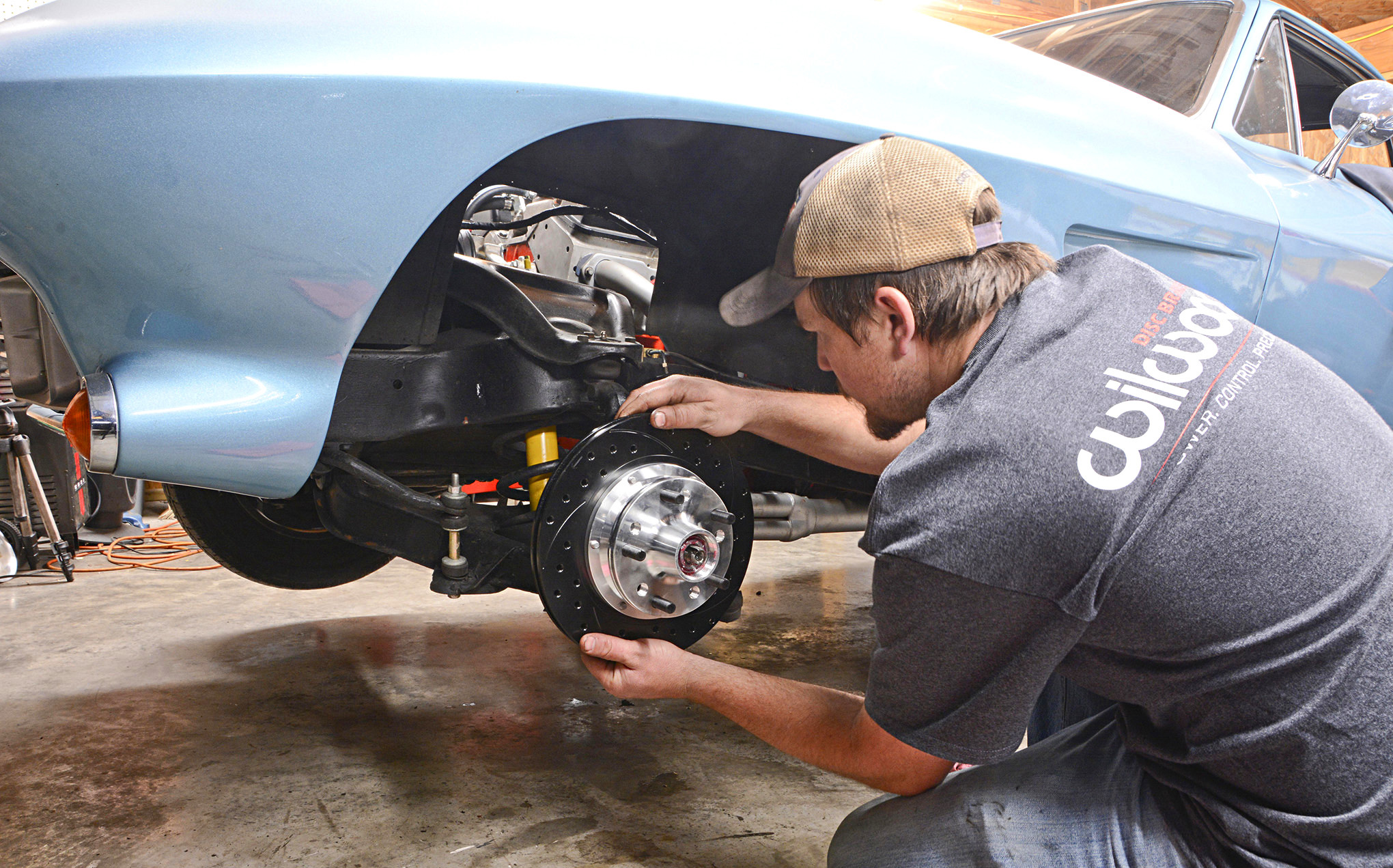Hearing your car’s brakes squeal can be worrying. This noise often means there’s a problem with your braking system. This post will show you how to fix brake squeal quickly and effectively.
Keep reading for easy solutions.
Table of Contents
ToggleCommon Causes of Brake Squeal
Brake squeal often starts when your brake pads wear down or get very smooth. Dirt on the pads or not enough grease can also make your brakes noisy.
Worn or Glazed Brake Pads
Worn or glazed brake pads are a top reason your car might make a squealing noise when you use the brakes. Over time, the surface of these pads gets smooth, losing its roughness needed to stop your vehicle effectively.
This happens after many miles of pressing against the rotors during braking.
Glazed pads don’t have good friction anymore because they’ve become too hard from high heat and pressure. You need that friction to slow down or stop your car safely. If you ignore this issue, it can lead to worse problems like damaged rotors or reduced braking power.
Good brakes can save lives; maintain them well.
A quick look at your brake pads will tell you if they’re worn out or glazed. If the pad’s thickness is less than 1/4 inch or it looks shiny and feels smooth, it’s time for a replacement.
Changing worn-out brake components is crucial for safe driving and can prevent costly repairs down the road.
Contaminants on the Brake Pads or Rotors
Dirt and other stuff can stick to your brake pads and rotors. This causes a loud noise when you press the brake pedal. Think about driving through mud or oil. These are common things that get on brakes and make them noisy.
I once had to clean my car’s brakes after a trip to the beach because sand got all over the pads and rotors.
To fix this, you need to use a cleaner made for brakes. This spray gets rid of dirt, grease, and other junk on your brakes without hurting them. It’s easy to do at home with just a few steps: take off the wheel, spray the cleaner on, and wipe everything down.
After doing this myself, I noticed my car stopped making that annoying squeal right away.
Lack of Lubrication on Brake Components
Your brakes need grease in the right spots to work quietly. Without it, metal parts rub together and make noise. Think of brake components like pads, calipers, and rotors needing a thin layer of lubricant.
This helps them move smoothly without squealing.
You should put grease on parts where the brake pad touches the caliper. Also, apply it to bushings and back plates. Use products meant for brakes, like high-temperature grease or anti-squeal compounds.
They can handle heat from braking without melting away. This step keeps your car quiet and improves how well your brakes work.
Quick Fixes for Brake Squeal
To stop brake squeal fast, try simple fixes like applying shims or anti-noise paste to the pads. Clean the brakes with a cleaner spray to remove dirt and grime that cause noise.
Applying Brake Pad Shims to Reduce Noise
Brake pad shims act as a noise-canceling barrier between your vehicle’s brake pads and calipers. These thin metal or rubber layers stop vibration, which cuts down on braking noise.
First, you need to check if your brake pads came with shims attached. If not, you can buy them separately. Once you have the shims, attach them to the backside of each brake pad before reinstalling the pads in your car.
Installing these shims correctly ensures quiet and more comfortable driving. Make sure they fit snugly and don’t shift during installation. This simple step can greatly reduce squealing and make your rides smoother without the need for extensive repairs or replacements of other brake components like rotors or calipers.
Using Brake Quiet or Anti-Squeal Compound
Apply a quieting or anti-squeal compound to eliminate the noise. This substance is applied to the rear of your brake pads. It creates a layer that mitigates vibration, thereby reducing squealing.
Ensure you avoid accidental application on the part of the pad that comes into contact with the rotor.
“Employ it correctly, and you’ll observe a reduction in noise.”
I applied this compound to the brakes on my car last month. The disparity was evident by the following day. Now, each time I press the pedal, there’s no shrill sound. Give it sufficient time to dry before reassembling everything and resuming your drive.
Cleaning the Brake Pads and Rotors with Brake Cleaner
Start by spraying a generous amount of brake cleaner on both the brake pads and rotors. This helps remove all the dirt, grease, and brake dust that often cause squealing noises. Make sure to cover every part well with the spray.
After applying, let it sit for a few minutes to break down the contaminants.
Next, take a clean cloth and wipe off all the parts thoroughly. You might need to use more than one cloth if there’s a lot of grime. During my own maintenance work, I found this step crucial in preventing brakes from squealing again quickly.
It’s simple but very effective in keeping your braking system in top shape without much hassle or expense.
Step-by-Step Guide to Fixing Brake Squeal
Follow this guide to stop brake squeal: check brakes and rotors for wear, clean and apply lubricant on pads, use shims for alignment, then test drive to hear the difference. Your car will run smoothly again.
Inspecting the Brake Pads and Rotors for Wear
Check your brake pads and discs for signs of wear. You need to see if the pads are thin or if the rotors have deep grooves. Thin pads mean they can’t grab the rotor well, making your car squeal when you stop.
Deep grooves in the rotor also cause noise and bad stopping.
Take off the wheels to see everything better. Use a gauge to measure pad thickness. If it’s less than 1/4 inch, replace them. Look at your discs too. They should be smooth and thick enough.
Rough or uneven surfaces mean trouble, leading to noise and weak braking.
Removing Brake Pads and Applying Anti-Squeal Lubricant
First, take off the wheel to reach the brakes. Use a wrench to loosen and remove the lug nuts. Then, pull the wheel away from your vehicle. Next, you must locate the brake caliper that holds the pads against the rotors.
The caliper is on top of the rotor disk. Unscrew it with a ratchet and carefully lift it away without stretching or breaking its hose.
Now, take out old brake pads from their spot in the caliper bracket. Sometimes they stick but slide them outward and they’ll come free. Before putting new pads on, apply anti-squeal lubricant on their backs where they touch the piston or caliper bracket but do not get any grease on their surface that touches the rotor.
Applying anti-squeal lubricant helps reduce vibrations that cause noise.
Make sure everything goes back in place just right: Pads should fit snugly into their slots before returning every part back together tight as before.
Reinstalling Pads with Proper Alignment and Shims
After applying anti-squeal lubricant, carefully put the brake pads back in place. Make sure they are aligned correctly. This step is crucial for reducing brake squealing. Misaligned pads can rub against the rotors wrongly, causing noise.
Next, add shims behind each pad if your kit includes them. Shims help by keeping the pads stable and preventing movement that leads to squeaks. They act as a cushion between the caliper and the brake pads, cutting down on vibration and noise.
Check everything twice to ensure proper fit before you take a test drive to see if there’s less noise.
Test Driving to Check for Noise Reduction
Go for a drive to check if the brake squeal is gone. Listen closely while you brake at different speeds. This helps see if your fixes worked well. During driving, pay attention to how your vehicle responds when applying brakes.
If you hear no noise, your efforts paid off.
If the squeal persists, it means something might still be wrong. It could be from parts not mentioned earlier, like drum brakes or rear disc brakes needing a look. Checking these parts can help solve the problem for good driving comfort and safety on the road.
Preventing Future Brake Squeal
To keep your brakes quiet, choose top-notch brake pads and clean the brake parts often. Add grease to important spots where metal touches metal to stop squeals before they start.
Using High-Quality Brake Pads
Choosing high-quality brake pads is crucial for stopping brake squeal and ensuring your vehicle’s safety. These pads are made from better materials that last longer and perform well under different driving conditions.
They produce less dust and noise compared to lower quality options. You have probably noticed that some brakes are quieter than others. This difference often comes down to the quality of the brake pads.
High-grade pads like ceramic or high-performance ones might cost more upfront, but their durability means you won’t have to replace them as often. They also handle high temperatures better during heavy braking, which reduces the chances of squealing noises.
From my own experience, after switching to a reputable brand’s ceramic pads, I noticed an immediate decrease in noise and an improvement in my car’s braking power.
Good brakes do not happen by chance; they are designed with quality parts.
Regularly Cleaning Brake Components
Keep brake parts clean to stop squealing. Dust and dirt can make brakes noisy. Use a good cleaner meant for brakes. Spray it on the pads and rotors. This removes grime that causes noise.
Also, check for wear often. If parts look worn or dirty, clean them right away. This keeps your braking system working well and quietly. Tools you need are simple: a cleaner spray and cloth to wipe down the parts.
Doing this regular maintenance helps prevent brake squeal and keeps you safe on the road.
Applying Lubrication to Key Contact Points
To stop brakes from squealing, you need to apply lubricant to the right spots. Look at the back of the brake pads and where they touch the caliper brackets. These are key contact points.
Use a high-quality grease meant for this job. Do not put grease on the pad’s front surface or on the discs.
For best results, also add a bit of lubricant on caliper slides and pins. This helps everything move smoothly when you press and release the brake pedal. Make sure to clean any old grease off first before applying new lubricant.
Using proper greases reduces noise and keeps your braking system working well.
When to Seek Professional Help
If your car’s brakes keep squealing after you’ve tried fixing them, or if you notice the brake pedal feels weird or the stopping power isn’t what it used to be, it’s time to call a pro.
A mechanic can check for deeper issues like bent brake discs or problems with the caliper, which are parts of your braking system that might need expert attention. Keep learning how to take good care of your vehicle by seeking out more tips and tricks.
Persistent Squeal After Lubrication and Adjustment
You’ve tried lubricating and adjusting your brakes, but they still squeal. This might mean it’s time to check for other issues. Brakes squealing can be a sign that something more serious is wrong.
Look at the brake rotors and calipers closely. They might be warped or not working right.
I once faced this issue with my own car. After doing all the usual fixes, the squeal didn’t stop. It turned out one of the brake rotors was damaged beyond repair. I had to replace it to finally get rid of the noise.
So, if you’ve done everything by the book and your vehicle’s brakes still make noise, checking these parts may solve your problem.
Signs of Rotor Warping or Caliper Issues
Your brakes play a key role in your vehicle’s safety. Signs of rotor warping include a wobbling feeling when you press the brake pedal or a vibration in the steering wheel during braking.
These signs mean the brake rotors, the discs that your brake pads clamp down on to stop your car, aren’t flat and even anymore. Rotor warping can make stopping your car take longer.
Caliper issues might show up as one side of your car pulling when you try to stop. This happens because the caliper, which holds the brake pads and presses them against the rotors, isn’t releasing correctly.
It causes uneven wear on your brake pads and can increase stopping distance. Both situations need quick attention for safe driving.
Abnormal Brake Pedal Feel or Response
If your brake pedal feels soft or sinks to the floor, this is not normal. It means there might be air in the hydraulic system, or you have a fluid leak. Both issues are serious and affect how well you can stop your vehicle.
Fixing these problems fast ensures your braking system works right and keeps you safe on the road.
You might also notice a hard brake pedal. This usually happens when the power assist mechanism isn’t working correctly. Most cars use a vacuum from the engine or an electric motor to help you push the pedal down easily.
If pushing down feels too hard, something’s wrong with this part of your brake system. Checking and fixing any issues with these components are key steps in maintaining your vehicle’s braking performance.
Conclusion
Fixing brake squeal quickly is simple with the right steps. First, check your brakes for wear and dirt. If you find any, clean them or replace the worn-out parts. Adding shims and lubricants can also stop the noise.
Keep your brakes in good shape by choosing quality pads and cleaning regularly. For tough problems, a mechanic can help. This way, you’ll enjoy quiet braking again fast.
FAQs
What are some quick solutions for brake squealing in my vehicle?
Quick solutions to fix brake squeal involve diagnosing the issue, replacing certain brake components and maintaining your braking system regularly. Regular maintenance can prevent future noise issues and keep your vehicle’s brakes functioning optimally.
How do I diagnose a brake squeal issue in my CDJR vehicle?
Diagnosing a brake squeal involves listening carefully to the sound of your brakes when you apply them. If there’s a high-pitched noise, it could indicate worn-out components that need replacing or an issue with the alternator.
Can preventative measures help stop my vehicle’s brakes from making noises?
Yes, preventative measures play a crucial role in stopping brake noise. These include regular checks on all parts of the braking systems and timely replacements if any wear or damage is found.
When should I consider replacing brake components to stop the squeal?
If troubleshooting tips don’t work and you’ve ruled out other potential causes like wiper problems, then it might be time to replace certain parts of your braking system such as pads or rotors.




